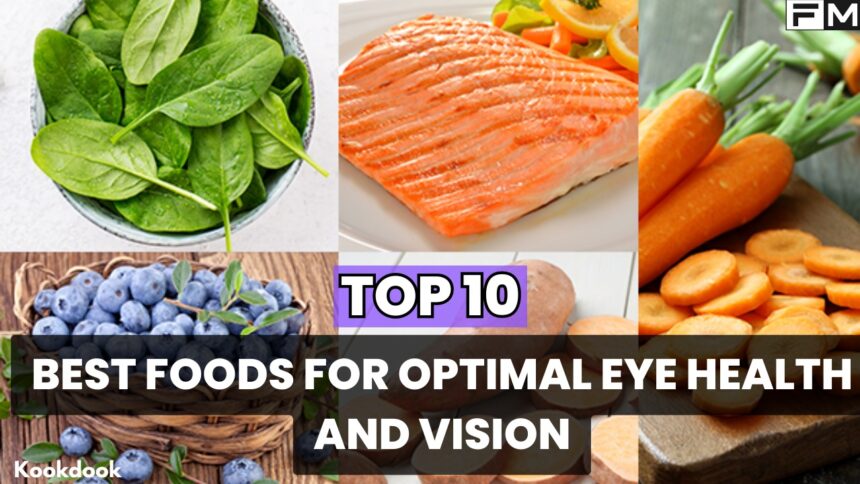The overall state and functioning of the eyes are known as ocular well-being. Maintaining optimal ocular health is crucial for clear vision, preventing vision loss, and addressing various eye concerns. Several factors, including genetic makeup, age, and lifestyle, can influence eye health. Common eye conditions encompass astigmatism, cataracts, glaucoma, age-related macular degeneration, nearsightedness, farsightedness, and astigmatism.
Many of these conditions can be managed with the aid of eyeglasses, contact lenses, or surgical interventions. Furthermore, adopting a healthy lifestyle, which involves consuming a nutritious diet, engaging in regular exercise, and using protective eyewear, can often act as a preventive measure or slow down the progression of these conditions. best foods for optimal eye health
Fish:

Fish is a valuable source of omega-3 fatty acids, vitamins A and D, and other nutrients essential for maintaining optimal eye health. Incorporating varieties like salmon, tuna, and sardines into your diet can contribute to lowering the risk of dry eyes, macular degeneration, and other eye-related issues. Ensuring sustainable fishing practices helps maintain fish populations and supports the health of our oceans.
Leafy Greens:

The inclusion of leafy greens, such as spinach, kale, and collard greens, in your diet offers a wealth of nutrients beneficial for your eyes. Rich in antioxidants like lutein and zeaxanthin, these greens can protect your eyes from oxidative damage. Vitamins A and C, found in abundance, play a crucial role in maintaining good vision. Incorporating a diverse range of leafy greens can promote long-term eye health.
Eggs:
Eggs are a fantastic source of vitamins A and E, lutein, and zeaxanthin, all of which contribute to maintaining healthy eyes. These nutrients are particularly effective in reducing the risk of age-related eye diseases like cataracts and macular degeneration. Focusing on egg yolks allows you to access these valuable compounds. Moderation in egg consumption is advised, especially for individuals with high cholesterol or heart disease risk.
Whole Grains:
The wealth of nutrients in whole grains, including B vitamins, zinc, and antioxidants like selenium, makes them a great addition to your diet for supporting eye health. Protection against age-related eye conditions and free radical damage is provided by these vitamins and minerals. Opt for whole wheat, oats, quinoa, and brown rice over refined grains to maximize the eye-boosting benefits.
Citrus Fruits And Berries:
Citrus fruits and berries offer a wide array of minerals, including vitamin C and folate, along with antioxidants like lutein and zeaxanthin. These compounds help safeguard your eyes from free radical damage and contribute to a reduced risk of age-related eye diseases like cataracts and macular degeneration. Including a colorful assortment of oranges, lemons, berries, and more in your diet supports overall eye health.
Nuts:
Nuts, such as almonds, walnuts, and hazelnuts, are a valuable source of nutrients like zinc, vitamin E, and omega-3 fatty acids. These elements play a crucial role in reducing the risk of age-related eye issues and protecting against free radical damage. Incorporating a variety of nuts in moderation can enhance your eye health, just be mindful of caloric intake and choose unsalted options.
Colorful Vegetables And Fruits:
Brightly colored fruits and vegetables are rich in antioxidants and other compounds that promote eye health. A diet abundant in colorful options like leafy greens, berries, oranges, sweet potatoes, and red peppers can help protect your eyes from free radical damage and age-related conditions like cataracts and macular degeneration.
Legumes:
Legumes, including beans, lentils, and peas, provide a valuable source of nutrients like protein, fiber, zinc, and selenium. These components contribute to maintaining eye health by lowering the risk of age-related eye problems and protecting against free radical damage. Incorporating a variety of legumes into your diet, especially for those following vegetarian or vegan lifestyles, supports both eye health and overall well-being.
Milk And Milk Products:
Milk and dairy products, such as cheese and yogurt, offer essential nutrients like calcium, protein, vitamin A, and vitamin D that are beneficial for eye health. Including these items in your diet can help reduce the risk of age-related eye issues like cataracts and macular degeneration, while also supporting overall eye health. Opt for low-fat or fat-free options when aiming to manage weight or reduce heart disease risk.
Additional Strategies for Optimal Eye Health:
Taking steps beyond the basics can significantly contribute to maintaining excellent eye health. Here are some additional measures you can adopt to ensure your eyes stay in great condition:
- Shield Your Eyes from Blue Light: In our modern digital age, prolonged exposure to screens emitting blue light can pose risks to eye health. Employ blue light filters on your devices or consider wearing specialized glasses designed to mitigate the potential harm caused by blue light.
- Stay Hydrated for Healthy Eyes: Adequate hydration is vital not only for your overall health but also for your eyes. Proper water intake helps maintain optimal moisture levels in your eyes and prevents discomfort arising from dryness.
- Nourish with a Balanced Diet: Beyond specific vitamins, a well-rounded diet rich in antioxidants, omega-3 fatty acids, and minerals like zinc plays a pivotal role in supporting eye health. Incorporate foods such as salmon, spinach, carrots, and oranges into your daily meals.
- Prioritize Quality Sleep: Sufficient and restful sleep not only benefits your overall well-being but also contributes to optimal eye health. Inadequate sleep can lead to eye strain and other discomforts.
- Engage in Regular Physical Activity: Routine exercise enhances blood circulation, which in turn positively impacts your eye health. Activities like walking, jogging, and yoga can aid in maintaining healthy eyes.
- Manage Screen Time: In addition to taking breaks, consider limiting extended periods of screen time, particularly before bedtime. This practice helps mitigate digital eye strain and promotes better sleep quality.
- Embrace Good Eye Hygiene: Practicing proper hygiene, such as washing your hands before touching your eyes, can significantly reduce the risk of infections and other eye-related issues.
- Regular Check-ups for Holistic Health: In addition to eye exams, scheduling regular check-ups with your primary care physician is essential. These visits help in managing underlying health conditions that could indirectly affect your eye health.






